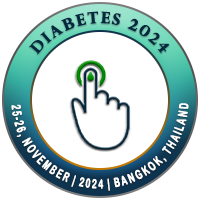
Lucas Faria De Castro
University of Brasilia, BrazilTitle: Beneficial effects of high doses of cabergoline in the treatment of giant prolactinoma resistant to dopamine agonists: A case report with a 21-year follow-up
Abstract
We describe the case of a boy diagnosed with macroadenoma at the age of 9 and followed up for 21 years. He did not fully respond to treatment with dopamine agonists. His initial prolactin level was 2,400 ng/mL (in males, normal values are <16.0 ng/mL) and never normalized. At the last assessment, his prolactin level was 21.5 ng/mL, recorded after 21 years of treatment with the dopamine agonist cabergoline at a dose as high as 4.5 mg per week. Although the prolactin level remained elevated throughout the follow-up period, the patient never presented a low testosterone level and had normal pubertal development. An MRI of the sella turcica showed that the tumor became progressively cystic and disappeared, but a normal pituitary gland was observed. The pituitary gland retained its normal functions despite a partially empty sella.
Long-term treatment with high doses of cabergoline may cause cystic degeneration of a prolactinoma considered to be resistant to this treatment, but we cannot rule out the possibility that this outcome represents the natural development of the tumour.
Biography
Lucas Faria de Castro is endocrinologist and medical assistant of University of Brasília. He completed his master´s degree at age of 34 years from University of Brasília, Brazil. He is part of the neuroendocrinology team of University of Brasília, neuroendocrinology. He has some important publications in endocrinology.

